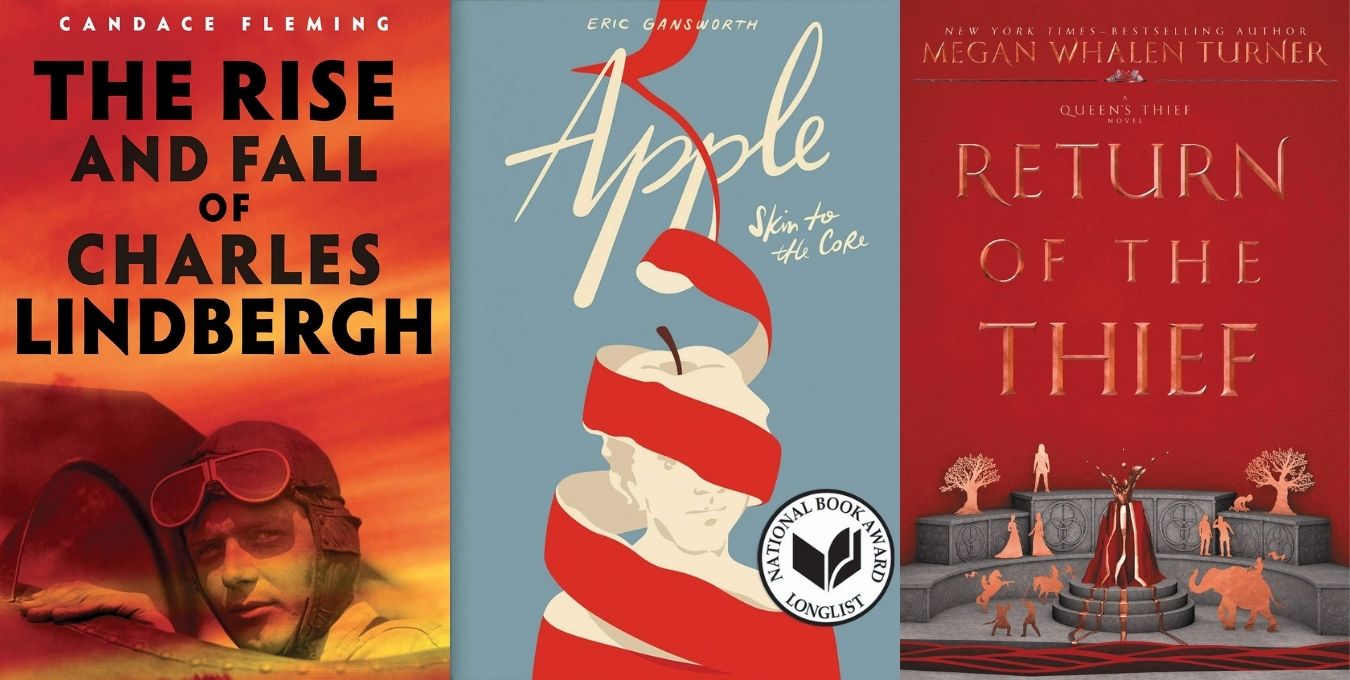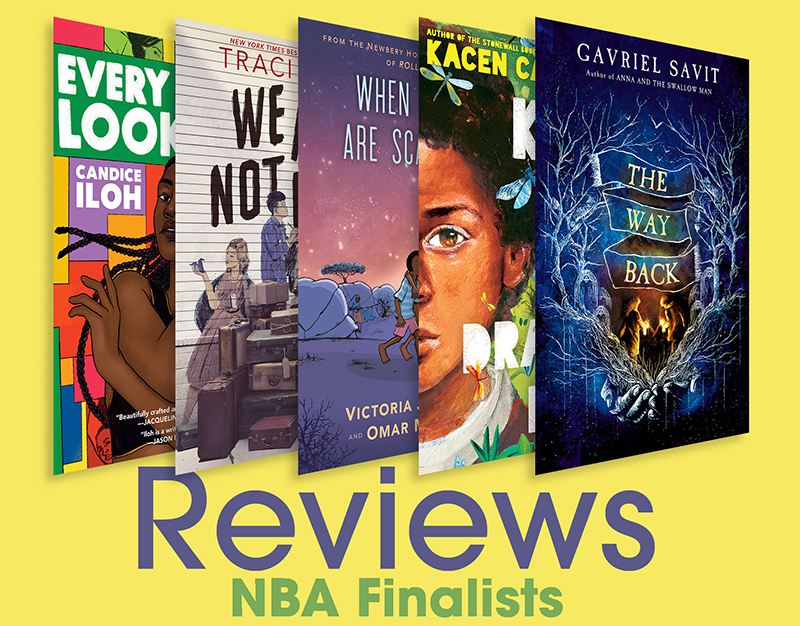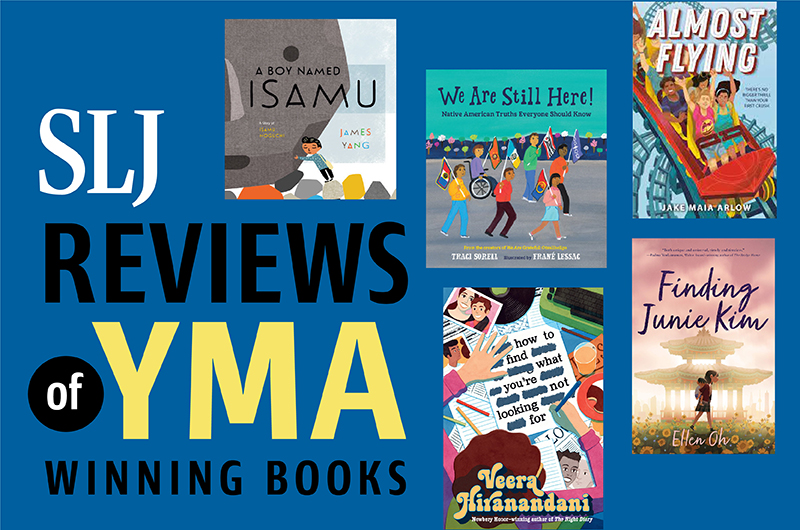The Key That Swallowed Joey Pigza
 This is the only book on our shortlist that we have not previously discussed, and while that may have made it something of a surprise, it really shouldn’t have been: the book got five starred reviews and was a Kirkus Prize finalist. This is the fifth and final book in the Joey Pigza series and by including this one, we allow ourselves the opportunity to revisit the annual sequel issue. I read the first and second book, but missed the third and fourth, so it’s been awhile. I felt like I never missed a beat. Gantos did weave some back story into the narrative, but it was seamlessly done.
This is the only book on our shortlist that we have not previously discussed, and while that may have made it something of a surprise, it really shouldn’t have been: the book got five starred reviews and was a Kirkus Prize finalist. This is the fifth and final book in the Joey Pigza series and by including this one, we allow ourselves the opportunity to revisit the annual sequel issue. I read the first and second book, but missed the third and fourth, so it’s been awhile. I felt like I never missed a beat. Gantos did weave some back story into the narrative, but it was seamlessly done.
The plot here is minimal–Mom checks into the hospital with postpartum despression, leaving Joey to care for the baby alone with his crazy father probably lurking in the shadows–indeed, some might find it a bit far-fetched in places. I wouldn’t quibble with that, necessarily, but I think it’s emotionally true. Joey’s voice which is a combination of heart and humor is ultimately what the reader tunes in for.
ADVERTISEMENT
ADVERTISEMENT
I have to tell you that I am a little disappointed because after my parents homeschooled me last year I now have to repeat a grade. I guess they used the wrong book to teach me. It was titled Homeschooling for Dummies and it must have worked pretty good because I feel like one.
I like how the title of the fifth book is a play on the very first one, JOEY PIGZA SWALLOWED THE KEY. It suggests that Joey’s problems are insurmountable, that he cannot overcome his ADHD, his dysfunctional parents, or the culture of welfare and poverty. But, of course, Joey does triumph, and appears, by book’s end, to be in a place where he can rise above it all. We know it won’t be easy, but we know he can thrive.
Is this the most distinguished contribution to American literature for children? Well, I already have my top two spots locked up, but I’m shopping for a third place vote. This is more character-driven than my taste, but I can’t deny the charm of the book. Maybe . . .
Filed under: Uncategorized
About Jonathan Hunt
Jonathan Hunt is the Coordinator of Library Media Services at the San Diego County Office of Education. He served on the 2006 Newbery committee, and has also judged the Caldecott Medal, the Printz Award, the Boston Globe-Horn Book Awards, and the Los Angeles Times Book Prize. You can reach him at hunt_yellow@yahoo.com
ADVERTISEMENT
ADVERTISEMENT
SLJ Blog Network
Happy Poem in Your Pocket Day!
This Q&A is Going Exactly As Planned: A Talk with Tao Nyeu About Her Latest Book
Family Style: Memories of an American from Vietnam | Review
Parsing Religion in Public Schools
Environmental Mystery for Middle Grade Readers, a guest post by Rae Chalmers
ADVERTISEMENT








I think this book is absolutely fabulous. It is #four on my goodreads Newbery list. (I reviewed it for Horn Book and am very proud of that review so It is deservedly on their recently-announced yearly Fanfare list.) Here’s a reposting of my comment from the “Stranger than Fiction” Post:
I want to put in a plug for The Key that Swallowed Joey Pigza. I think Gantos does a wonderful job having us readers go on that wild ride with Joey. As before we are deep, deep, deep into Joey’s head, moving along wondering if we are heading into a train wreck or what. I think there is a story arc — how is Joey going to manage with Carter Junior on his own? And to deal with his father? I think Gantos does a remarkable job ending the book —somehow it feels that whatever happens Joey is going to get through it and see to it that Carter Junior does too. The incredibly craziness of what happens and the way Joey manages to get them through it makes me confident. And I think that is absolutely a remarkable thing for an author to do. It has been a while since I read the previous book, but I do remember it quite well (having looked at it very closely as it was out my Newbery year) and I do think we see some serious growth here with Joey, something that adds to the readers’ confidence that this boy will make it through. This book is breathtaking in spots, hilarious in others, and tender in still others. And, as Nina, notes, under 200 pages!
Ah, I thought we had discussed it, but for the life of me I couldn’t find the post . . .
Earlier in the season, we talked about present tense in general, but never really applied our thinking to specific books that we had all read. We have that opportunity now (and again with other shortlisted titles) to hold that particular convention up to closer scrutiny. Gantos uses it in the first couple chapters, but then drops it. I don’t think this is a good/bad novel because of how present tense is used, nor do I think it’s Newbery hopes rest on that either, but I do wonder: what does it add to the novel? Thoughts?
Interesting. I had forgotten the use of present tense at the start so just went back to look at it. It is used so deliberately to show Joey in that particular crazy way of his with past tense mixed into it. Fascinating. Works for me.
It’s very slight, only appearing in those first two chapters which are heavy on past tense because of the back story. I don’t think the present tense hurts the story, but neither do I think it accomplishes what you say either: showing Joey in that particular crazy way.
Interesting enough, maybe because I lack the context from not reading any of the prior Pigza books, I DID NOT get the feeling that Joey would make it through and be ok in the future. I was left with the feeling that Joey and his family will be right back in this mess in another week or so! Crawling into the crib in his father’s room, does not give me confidence that Joey will handle things well in the future. And honestly, Joey didn’t necessarily handle them well this time! A lot of luck was on Joey’s side!
For me, not having the benefit of reading previous Pigza books, the zaniness just didn’t work for me. The entire premise of the book, taking care of the baby while mom walked away to the hospital, is just strange to me. I guess I didn’t get the appeal from the beginning. A lot of it came out of left field. I felt that there was A LOT of context surrounding his mother and father’s relationship that I didn’t have knowledge of that really hindered my reading and comprehension of this novel.
I like zany, I just had a hard time liking any character in this book. Obviously my own personal level of enjoyment, doesn’t mean this isn’t distinguished literature though.
As I said, I only read the first and second book. The second book was published in 2000 so that’s 14 years ago. I remember Joey’s voice and the Grandma character, but not much else.
Like Monica, I already commented at some length on the Stranger Than Fiction post. I won’t re-post in full but will repeat my main points here. I’m evaluating it as part of the series, as I think that’s the stronger argument than as a standalone.
1) I have read the first three Joey Pigza books but not I AM NOT JOEY PIGZA.
2) I feel Joey’s character arc is almost completed in the first book alone. Going on meds and being able to function where he wasn’t before is the single biggest shift in the character in the series.
3) I feel the rest of the series is basically Joey having to deal with his parents. I feel Joey is a better-conceived character than either parent (see next point) so I think this was a troublesome direction for the series to take.
4) The parents almost feel like different characters in each book. Even though it’s explicitly stated that the dad “goes in circles” and the mom “up and down,” I feel this somewhat compromises the integrity of their characters and the series as a whole. For example, the mom’s (post-partum?) depressive side was a new development hard to extrapolate from the first three books.
5) Despite point 2) I do admit there is further development in Joey across the series — in book 2, he can’t cope with his dad without being rescued by his mom. In book 3, he wants to, but cannot, make things better with his parents, and the suggestion, voiced by the grandmother, is that he shouldn’t bother. I didn’t read book 4, but I would say the end of the arc in book 5 shows Joey finally being able to mold his parents in a good way.
6) This is a subtle, Clementine-like shift, but I was more on-board the Clementine bandwagon last year. I think it’s the parents. Are the mom and dad of book 5 even recognizably the same characters as the ones in book 2?
Leonard, your point about the parents as characters across the series is interesting, though I’d need to re-read the early ones at this point to remember. My feeling about the father in this one is that it was JOEY who was changing, and therefore his perception of his father is changing. This is what I appreciated most about this book…that though, indeed, Joey’s story has seemed wrapped up at the end of pretty much every book, we get to meet him again a little older and *gasp* wiser.
I just finished a re-read of JOEY, and want to highlight some other appreciations…
I’m repeatedly blown away by the straightforwardness and humor with which Joey approaches the really crummy circumstances in his life. Gantos pulls this out over and over, p.38 “Last week I had gone down to Goodwill, where they were handing out free school supplies. When I returned home….” The Goodwill and free supplies don’t figure in what he’s talking about, it’s just a by-the-way, but tells you so much about Joey’s family situation. Or, p.42 “When I heaved myself into Mom’s room she was half sitting up in bed. The phone was on the floor and her face was frozen over like she had hit her own pause button. Whatever button she had pressed I wanted to reverse it. Around her belly button I knew she had that dumb old tattoo that read “Press here for more options!” but that was not the button I was looking for.” We get so much out of Joey’s tone of voice here, and learn a little bit more about his kooky mother. Over and over Gantos spins out Joey’s thinking process in this way, a blow by blow account of his mind that makes us intimately familiar with his perspective.
I also saw the character development and arc much more clearly on second read. While it is a simple one, it’s handled dramatically and uniquely. The theme of “manning up” comes out over and over. That piece about Goodwill was a first hint; we get a bigger hint when Joey really takes responsibility of his baby brother. He surprisingly knows exactly how to take care of things, and yet is undoubtedly still Joey: p. 55 “I got two bags of mostly baby food. I got one bag of cleaning supplies and one with nothing but peanut butter and crackers because I knew I could live on that forever. And when we checked out I tripled the plastic bags just for Carter Junior so I could haul him around by the handles….” There’s the panties buying test, and Joey’s ultimate insistence that his Dad act like a man himself. This is not the Joey we’ve seen before, it’s the mature-tested-Joey.